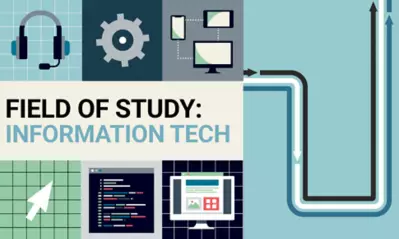Articles > Information Technology > What can you do with a data science degree?
What can you do with a data science degree?

Written by Michael Feder

Reviewed by Kathryn Uhles, MIS, MSP, Dean, College of Business and IT
One of the many fields experiencing growth — especially due to the rapid expansion of machine learning and artificial intelligence — is data science. Data scientists play an extremely important role in harnessing the power of large amounts of information to help make companies profitable. But what is data science, and what career options exist for those who pursue degrees in it?
A data science degree can open doors in tech
While the tech sector may not be immune to downsizing, generally speaking it experiences strong and steady growth. In fact, the U.S. Bureau of Labor Statistics (BLS) projects employment in computer and information technology occupations to grow much faster than the average for all occupations from 2023 to 2033. About 356,700 openings are projected each year, on average, over the decade.
BLS Occupational Employment Projections, 2022-2032 is published by the U.S. Bureau of Labor Statistics. This data reflects BLS’ projections of national (not local) conditions. These data points are not specific to University of Phoenix students or graduates.
What is data science?
Data science is a broad field in the technology industry that focuses on the design and creation of data modeling techniques and processes to help organizations collect and organize data to inform business decisions. The field has several specialties, including data mining, data engineering and machine learning.
While jobs in the data science field are available in a number of industries, they typically require the knowledge and experience provided by a relevant technology degree, such as one in data science or computer science.
Why is data science important?
Data is everywhere. Practically every smart device can automatically collect and store information. Online systems, payment portals, and mobile and desktop applications capture data for many purposes. Companies collect text, audio, video and image data in such vast quantities that they need professionals to help comb through it and make it usable.
Jobs with a data science degree
A data science degree can lay the foundation for many roles. Consider the following career options for bachelor’s and master’s degrees:
Information Systems Manager
What they do: An information systems (IS) manager is a professional who oversees and leads information technology (IT) teams. They may manage a variety of activities, such as workflow processes, troubleshooting, digital infrastructure maintenance and implementation of updates. This role may be found in any organization that employs an in-house IT team.
Salary: As of May 2024, computer and information systems managers earned between $104,450 and $239,200, with a median wage of $171,200, according to BLS.
Job outlook: Employment of computer and information systems managers is projected to grow 17 percent from 2023 to 2033. About 54,700 openings for computer and information systems managers are projected each year, on average, over the decade.
Salary ranges are not specific to students or graduates of University of Phoenix. Actual outcomes vary based on multiple factors, including prior work experience, geographic location and other factors specific to the individual. University of Phoenix does not guarantee employment, salary level or career advancement. BLS data is geographically based. Information for a specific state/city can be researched on the BLS website.
Data Analyst
What they do: A data analyst is a type of data scientist who focuses on processes for collating and understanding information. Typically, a data analyst uses existing tools to compile and organize data before analyzing that data for patterns and other points of interest. This analysis is then passed on for review and implementation.
Salary: As of May 2024, data scientists earned an annual salary between $63,650 and $194,410, with a median wage of $112,590, according to BLS.
Job outlook: Employment of data scientists is projected to grow 36 percent from 2023 to 2033. About 20,800 openings for data scientists are projected each year, on average, over the decade.
Database Architect
What they do: Another career for someone with a data science degree is that of a database architect who develops, manages and maintains models, policies and procedures related to organizational data management. These professionals often work alongside software designers and analysts to optimize data architecture.
Salary: As of May 2024, database architects earned between $81,630 and $209,990, with a median wage of $135,980, according to BLS.
Job outlook: Employment of database administrators and architects is projected to grow 9 percent from 2023 to 2033. About 9,500 openings for database administrators and architects are projected each year, on average, over the decade.
Computer and Information Research Scientist
What they do: Computer and information research scientists conduct field research and seek to reproduce phenomena under controlled conditions. This allows them to find patterns and produce relevant innovations. In the context of data science, these professionals may seek to achieve goals such as monitoring machine learning tools to determine how they operate in practice or utilizing data sets to more effectively test hypotheses.
Salary: As of May 2024, computer and information research scientists earned between $80,670 and $232,120, with a median wage of $140,910, according to BLS.
Job outlook: Employment of computer and information research scientists is projected to grow 26 percent from 2023 to 2033. About 3,400 openings for computer and information research scientists are projected each year, on average, over the decade.
Learn more about online data science degrees
If you’re curious about learning more about earning a data science degree, University of Phoenix offers online IT degree options. A couple to consider are bachelor of science in data science and an online data science master's degree.
Contact University of Phoenix for more information.

ABOUT THE AUTHOR
A graduate of Johns Hopkins University and its Writing Seminars program and winner of the Stephen A. Dixon Literary Prize, Michael Feder brings an eye for detail and a passion for research to every article he writes. His academic and professional background includes experience in marketing, content development, script writing and SEO. Today, he works as a multimedia specialist at University of Phoenix where he covers a variety of topics ranging from healthcare to IT.

ABOUT THE REVIEWER
Currently Dean of the College of Business and Information Technology, Kathryn Uhles has served University of Phoenix in a variety of roles since 2006. Prior to joining University of Phoenix, Kathryn taught fifth grade to underprivileged youth in Phoenix.
This article has been vetted by University of Phoenix's editorial advisory committee.
Read more about our editorial process.


Get your free IT Program Guide
Learn how 100% of our IT degree and certificate programs align with career-relevant skills.
Thank you
Download your pdf guide now. Or access the link in our email.


